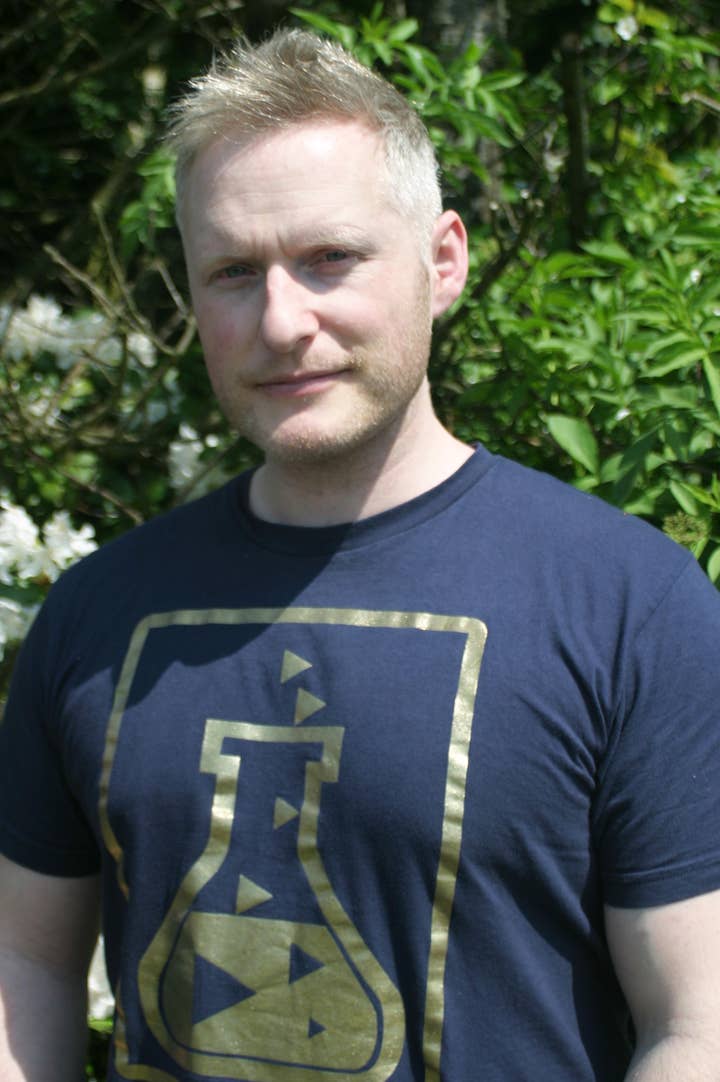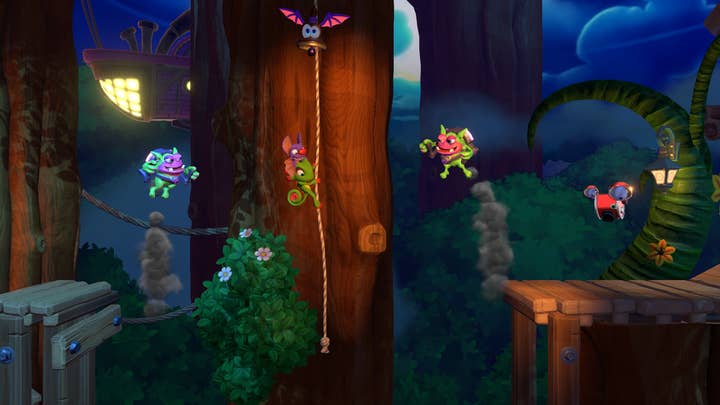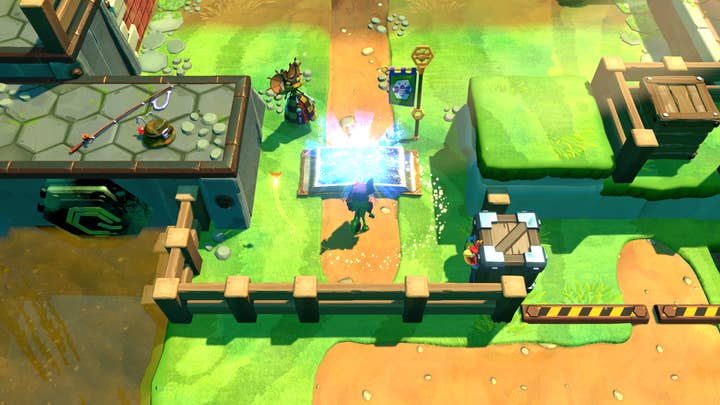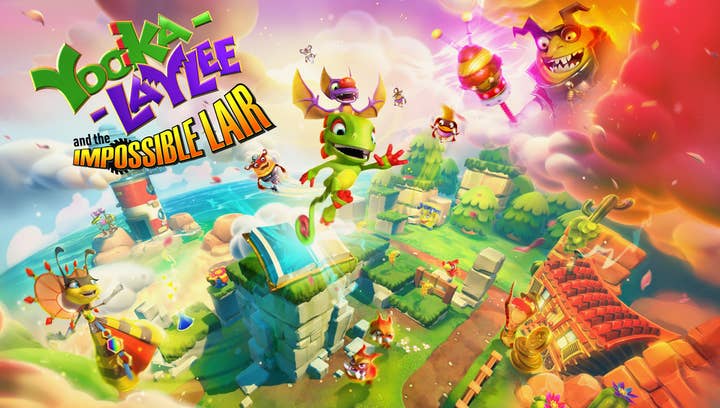Playtonic: “We are never using the term spiritual successor again”
The Yooka-Laylee studio on avoiding the comparisons to Donkey Kong Country
Playtonic wants to be clear: its new Yooka-Laylee game may look a little like Donkey Kong Country, it may sound a bit like Donkey Kong Country, and it may feature a few similar ideas, but Yooka-Laylee and The Impossible Lair is not a spiritual successor to Donkey Kong Country.
You can understand the confusion. Some of the original creators of Donkey Kong Country are working on it. And Playtonic's last game, 2017's Yooka-Laylee, was unashamedly a spiritual successor to Banjo-Kazooie -- another Rare classic from the 1990s.

"We are never saying spiritual successor again," Playtonic studio head Gavin Price tells GamesIndustry.biz. "It worked fantastically as a marketing beat for the first game, although it had some negative things with it, as well. But we need to stand on our own two feet more. We are going to make lots of games in lots of different genres for hopefully many years to come. You'll always be able to point back to something in the past and go 'oh, it's a bit like that then'. That's always going to happen. We need to focus on what makes our games relevant and unique."
"Donkey Kong Country: Tropical Freeze's cinematic budget is probably as much as our entire game"
To be fair, there are some significant differences between Yooka-Laylee and The Impossible Lair and the series it's not a spiritual successor to. You can tackle the final level (the titular Impossible Lair) at any time, for starters. But the biggest difference is its Zelda-style overworld, full of puzzles to solve before players can access the next 2.5D platforming level.
Yet there's also a practical reason why Price is playing down the spiritual successor tagline this time around. Whereas the first Yooka-Laylee was following a game in a genre not seen for over 15 years, the last Donkey Kong Country was released on Wii U in 2014 and updated for Switch in 2018.
"Donkey Kong Country: Tropical Freeze's cinematic budget is probably as much as our entire game," Price says candidly. "We are not going to win that fight. We have to find what makes our games special. It didn't really help that there were no other 3D platformers out there when we did Yooka-Laylee, because when people do compare you to something, they end up comparing you to that little company in Kyoto. Who, you know, are not bad.
"People might go, 'This is Playtonic, so this must be the successor to Donkey Kong Country, and so we better compare this to how Tropical Freeze looks and plays.' So we have to have something different about us and do our best to avoid those comparisons."

The first Yooka-Laylee was an immediate Kickstarter success when it was revealed back in 2015. It was a throwback to the 3D platform games of the late 1990s with their big worlds full of collectibles, and immediately caught the imagination of those that had grown up with such games.
However, this game isn't plugging the same gap. There's no shortage of 2D platformers on the market. And especially on Nintendo Switch.
Price argues that the popularity of the genre on Nintendo's console is a good sign. He cites that the first Yooka-Laylee was released seven months later on Switch and after Super Mario Odyssey, but very quickly caught up with the Xbox One and PS4 versions. The Impossible Lair has been created with the Switch audience in mind, and Price believes that audience is buying more games.
"Nintendo has created a device that is just perfect for a time poor person," he says. "They've created more opportunity for people to play video games. That's one reason why I think Switch games are selling in such high numbers, because people have more play time and are churning through more content."
Since the game's trailer debuted last week, the media has already dubbed the game a spin-off. The move from 3D to 2D, for some, suggests this isn't a 'main' Yooka-Laylee. Is he concerned that might impact sales?
"I am now. I was absolutely fine until you asked that question," he jokes.
"You know what... we don't have mind control devices. We can't tell people what to think. All we can say is that proof is in the pudding, give it a go. We think there's no other platform game like it out there."

The first Yooka-Laylee launched amid a swell of hype and expectation, driven by Kickstarter and more than two years of build-up. The Impossible Lair is due this year and Price let slip that the game is already about to enter certification. So it's nearly ready. There's no huge runway to launch this time.
"I didn't put too much thought into it. I hope, in future, Playtonic can be the developer that's in a good position where we can release something with a week's notice, but also have something we announce two years out. I don't think there's one template.
"This time around, Debbie [Bestwick] from Team17 was adamant that this was the right way to do it."
The first Yooka-Laylee shifted over one million units and generated £2.1 million over Kickstarter, so there's something to be said for announcing a game early. However, that title arrived to very mixed reviews and with an expectation that the indie team at Playtonic simply couldn't meet. The game improved significantly with a patch, but that first impression still lingers. The objective for this second game is to get it out and into people's hands, and show them that this is a step up from what came before.
"It is about getting that start right," Price says. "Hopefully there won't be any dramas or hype that becomes out of control. We might have been a bit guilty of fuelling that hype [with Yooka-Laylee], and there were advantages to it. But this time around it's been about getting on with it behind-the-scenes, making it a quality product, and keeping everything under our control."
In many ways, the Kickstarter was a double-edged sword for Playtonic. It launched the studio, but the firm also felt beholden to promises that hindered their ability to deliver the game they wanted.
"At times, we did fear that we had made a bad Kickstarter promise, so do we U-turn on it? Honestly, you tie yourself in knots"
"Not just with game features, but we also set ourselves silly tasks... we had to sign thousands of manuals," Price remembers. "One end of the office was just rows and rows of wallpaper pasting tables filled with manuals. All of us just kept grabbing bundles of manuals and signing them. It took some of us two days.
"When you do this stuff, you just look at what has been a success for other crowd-funding campaigns. And successful ones may have over-achieved what they wanted to do commercially, but they did it with hundreds or maybe a few thousand backers. We had 80,000-odd. We had promised a lot of stuff. At times, we did fear that we had made a bad promise, so do we U-turn on it? You have tonnes of people saying: 'Just take your time. And if things change along the way, we trust you'. But then you have other people going: 'You promised me this and this, and I own your soul'. And you're like: 'Well, they might do'. Honestly, you tie yourself in knots.
"You know you're decent human beings just trying to make the best game you can that lays a foundation for many years to come, and so we can support our families and maybe have an extra topping on a Dominos pizza. But, if we were to do a crowd-funding again, there would be so many things that we'd change."

There were numerous challenges for Playtonic when making the first Yooka-Laylee. The pressure of Kickstarter, growing the team from six to 20, setting up a company, learning a middleware engine, learning how to make a multi-format game, trying to remember how 3D platformers worked...
"We even had someone in Belgium try to trademark Yooka-Laylee so that we'd have to give them money," Price remembers. "You're fighting battles like that in between making a level.
"When you look back, we're surprised the game came out anywhere near the quality that it did.
"We do learn from mistakes. [The Impossible Lair] was set-up from the start to hit really high performance targets. We have it coming out day and date across all platforms, which we couldn't achieve last time. Everything under the hood will be technically better. And the next game we do will be better than this one.
"We even had someone in Belgium try to trademark Yooka-Laylee so that we'd have to give them money"
"Commercially, hopefully, we will be that bit more successful. That means we can become the type of company that takes more creative risks. I'd be happy for us to make games that make people go 'wow, this is fantastic', but don't make a 5000% return. That's ok, because we learnt something about ourselves as developers, and we built something very niche and cherished. We will always need big hits as well, but I do want us to get to that space where we can do some different, indie-focused stuff. The sort of things that you can definitely not compare to what we've done in the past."
Price has always dreamed big with Playtonic. Last time we spoke with him he discussed the firm's aim to release a game or two every year. "Maybe even three games," he says now.
Yet that ambition is tapered by a nervousness, too. What we played of The Impossible Lair felt really good. But Price knows that in this industry, success is never guaranteed, no matter how good you might be.
"I'm always nervous," he concludes. "It's been two and a half years since the first Yooka-Laylee, and the landscape for gaming has changed again. There are even more games released on Steam, and now Epic has opened a store, but that doesn't matter because everyone is just playing Fortnite anyway. Everyone is about free games. And Game Pass is a thing, and it's taking off from what I hear. There are so many things that have happened in a short space of time. Our first game was commercially successful, and it ended up winning over a load of people... so with the second game, surely nothing can go wrong? But the market has changed so much. I'm still not sleeping.
"There are so many stories of companies who had hit after hit after hit, but don't exist today. And those that missed a few times, but went on to be really successful with a hit game.
"We are very aware that you can trip over things you didn't see coming. We're not going to go crazy and build that office with a slide between floors. We are just going to take baby steps and keep building, try and keep a bit more under the radar and let our games speak for themselves, rather than the hype machine we had with Yooka-Laylee. Touch wood that will work out for us."
